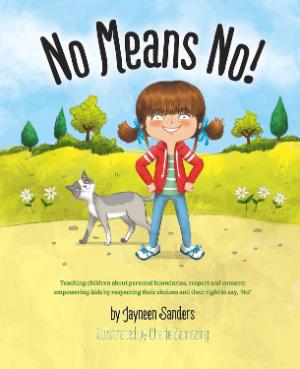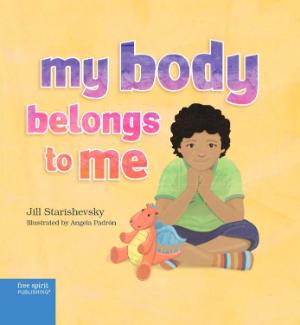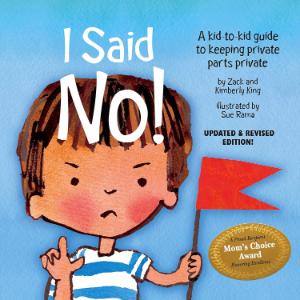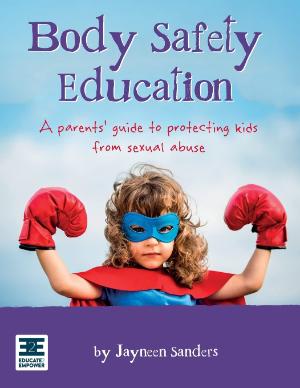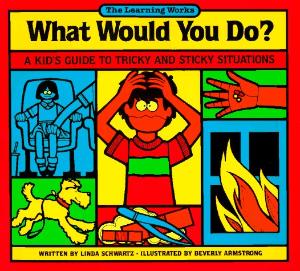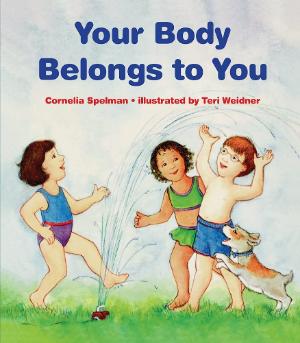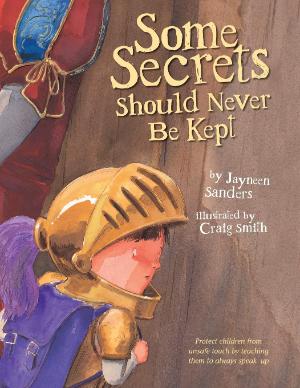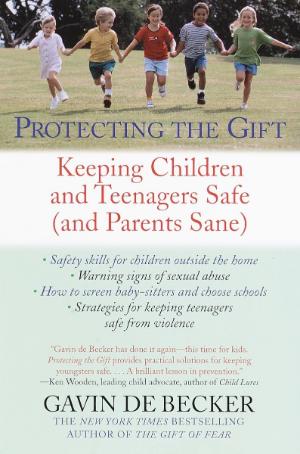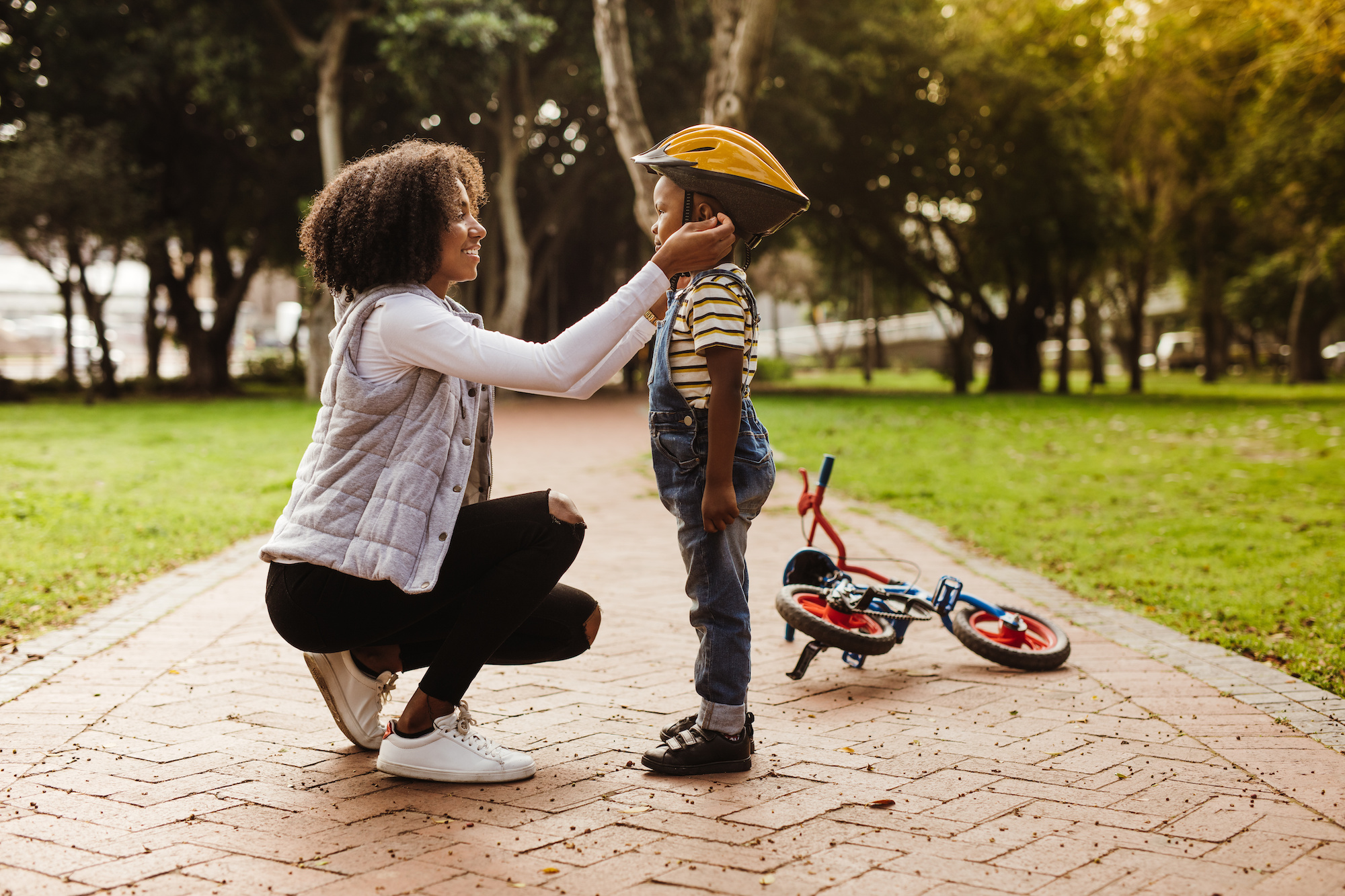
And yet it doesn't help our children to over-protect them. It's our job to gradually give our children more and more independence, which means that we need to teach them how to keep themselves safe in the world without undermining their trust that the world is a good place.
So here you are, one dozen basic Family Safety Rules that every parent can implement, that work to help you to keep your child safe as you let go of their hand.
1. Prioritize Connection.
The best way to keep your child from being abused by predators, bullied, using drugs, becoming sexually active before they're ready -- virtually every risk factor you can think of -- is to maintain a close relationship with them.
"Every time you respond to your child's cry of hunger or pain or discomfort, you raise a child who knows he will be heard," say safety experts Ric Bentz and Christine Allison. Children who feel heard and taken seriously are much more likely to stick up for themselves, to fight back, and to ask for help.
Put down your phone and listen. Sit down to dinner together as many nights as you can. Make sure you have one on one time -- unstructured (this isn't for homework or reading to them), to see what bubbles up and help your child express problems and upsets -- with each child every day, preferably for at least 15 minutes with each child.
If you notice that your child is defiant or distant, make it a high priority to re-connect: Why You Need To Re-Connect Daily with Your Child.
2. Teach your child to cross the street.
It's so automatic for us that we often don't realize that children need to be taught to cross the street safely. When your child is young enough to hold your hand, stop every single time and announce "Let's cross safely. First check the signal -- it shows the person walking, so we can cross. Now we look left, then right, then left again. Any cars? Okay, now we can cross!"
As children get older, they often rebel against having their hand held. If that happens, give your child some control. Ask him to take charge of the ritual and direct you; he can hold on to your purse strap or wrist. By the time he can cross by himself, safe habits will be engrained.
Needless to say, looking at your phone while you're crossing the street is terrible modeling for your child. Be sure once he's old enough for a phone, he has the discipline to put it away while crossing the street-- just like you do.
3. Make sure that your child knows your phone number and address.
If you inadvertently get separated in a crowd, your child needs to know your phone number and address. Play a game with your child where they recite their name, address and your phone number, and you reward them by making a funny animal noise or game show gong noise. If your young child is a runner who takes off and doesn't initially realize that they can't see you -- as is true for many neurodiverse kids -- you may even want a tracker in their shoe.
4. Give your child the tools to protect them from bullying.
Bullies prey on children whom they perceive to be vulnerable. The best way to keep children from being bullied is to make sure they have high self esteem and strong relationships at home and with peers.
Bullying behavior often begins by "testing the waters" with a mean remark, to see if they can goad the target child into hurt or upset. If your child is being bullied, role-play with him how he can stand up to a bully with quiet dignity and walk away. Kids need to be reassured that there is no shame in being frightened by a bully, in walking away, or in telling an adult and asking for help. Bullying situations can escalate, and saving face is less important than saving their life. For more on protecting your child from bullying, see Empower Your Child Against Bullying.
5. When your child goes to someone's house on a playdate, be sure you know the family, and watch your child for cues about what's happened.
Get to know the parents at households where your child spends time. Talk to him about what goes on at his friends' houses. Are the kids unsupervised on the computer? Allowed to stroll up to the store alone? Would he be able to recognize if his friend's mother was inebriated? Would he know what to do if his friend's father touched him inappropriately? What if his friend suggested they look at porn, or play a new "secret" game involving touching, or sniffing markers?
Before your child plays at a new friend's house, ask if they keep guns, and if so, how they are secured. Teach your children to leave any room
and house immediately if a gun appears – loaded or not. It would be great if your child can say "I'm not allowed to be in a room with a gun," but your child will be under great social pressure at that point, and that invites a discussion that your child will then get sucked into. Any child old enough to be on his own at a playdate understands social lies and will be grateful for your permission to say something like
“Oops, I just remembered I have a dentist appointment!”
6. Instead of teaching "Stranger Danger" teach kids to trust their instincts and stand up for themselves.
Teaching your child to be afraid of strangers does not actually protect your child. Most sexual predators are known to the child. Instead, teach that most people are okay, but there are a few people out there who do bad things, and could hurt her. She needs to be told explicitly that it is more important to stay safe and to trust herself than to be polite or nice. It is okay for her to question, disobey, and even run away from someone whose behavior is making her acutely uncomfortable.
Predators give signals; your child just needs your support to trust herself in reading them. Teach your child what constitutes improper behavior on the part of an adult, for instance, that it is inappropriate for adult strangers to offer children treats or to ask them for directions, and their reaction should be to walk away immediately, and always to fight back and shout "Help me! This is not my parent!" If she's in a public place and gets worried, teach her to run to a mother with a child, who can generally be counted on to help.
7. Give your child the tools to protect them from sexual abuse.
The statistics are that one out of every three girls will have suffered some unwanted sexual touching by the time she is sixteen. But don’t assume
only girls are sexually molested; the stats for boys are almost as bad, one out of six. According to the National Center for Missing and Exploited
Children, someone the child knows and trusts usually perpetrates child molestations, so teaching "Stranger Danger" completely misses the point
and does not protect children. Instead:
- Teach Consent. If you want your child to stand up for herself in an abuse situation, it's critical that she be allowed to make her own decisions about who touches her body from an early age. Raise both boys and girls with the house rules that "We ask people before we touch their body" and "When someone says STOP!, we stop." Don't "steal" kisses or hugs if your child says no. Never force your child to be touched by a relative or friend if she doesn't want contact. She must be respectful, and you can ask her to blow a kiss to Grandpa instead of giving a hug, but she must be in charge of her own body.
- Teach your child that in your family, no one ever keeps secrets. Molesters usually begin "grooming" by seducing kids into complicity with mild secrets: "Don't tell your mom I gave you candy." Your child needs to know that anytime anyone asks her to keep a secret, she is to tell you immediately. This applies to kids as well as adults, since children who have been inappropriately touched often "act out" that trauma onto other children. In fact, I often hear that another child, older in years or experience, is the one who "teaches a secret game" to a child, with tragic results. Make sure your child knows he can tell you anything, and that you will love him no matter what he's done.
- Educate. Teach your child that every part of her body covered with a swimsuit is private, belonging only to her. Every child should have (and be regularly read) books like No Means No! by Jayneen Sanders and My Body Belongs to Me by Jill Starishevsky. Teach your child that no one – no adult, no child, not even her parents, NO ONE – should ever touch her in ways that make her uncomfortable.
- Protect. Don’t leave your child with anyone, even your boyfriend, unless you completely trust them. The good and bad news about abuse is that most of it, statistically, is not perpetrated by strangers. It happens at the hands of family members or the mother's boyfriend. Almost all the rest is perpetrated by trusted intimates such as coaches, religious leaders or teachers. Bad news? Yes, these are people your child trusts. But it’s good news because it’s a risk you can usually avoid, if you trust your instincts and pay attention to your child. This is just one of the many reasons that stepparents should never have the responsibility of disciplining their partner's children.
8. Every child should know how to swim.
Drowning is the leading cause of death for children aged one to four, and the second (after car accidents) for children ages five to 14. Since toddlers are most at risk of drowning, supervision is critical near pools or creeks, and of course when a bathtub has water in it. Solid neon colored swimsuits show up best underwater, so are most recommended by lifeguards. And be sure your child of any age knows NEVER to dive into water that she has not already personally established to be deep and safe.
9. Make helmets non-negotiable for cycling, skating or skate-boarding.
They reduce the risk of brain injury by 90%.
10. Cars are dangerous.
If you are transporting a little one in the back of your car, train yourself to check the car before you get out to be sure your child is out of the car, so you don't space out and forget a sleeping child – horrible to even think about, I know, but we're sleep-deprived parents and every year, babies and toddlers die when they are left in cars.
Train your child to buckle up. Teach them to get out of any car immediately if the driver is drunk. Role play with them what they can say to get out of the car and to a safe place. (Again, “I’m carsick! I'm going to throw up! Stop the car quick!” may not be strictly true, but will be a lot easier for your child to say than "You're behaving erratically and I think you may have been drinking. Please let me out of the car.") Make sure that she knows she can always call you for a ride regardless of the situation.
Car accidents are the leading cause of death among teens. Once he starts driving, make sure he hears any personal stories you have about kids who've died in car accidents; that story could keep him alive. When you see a news story about an accident caused by a driver texting, discuss it at the dinner table. Admit that you're tempted, too, but role model turning off your phone and putting it in your bag in the back seat. (Need directions? Print them out in advance or pull off the road to check them.)
11. When your child begins using public transit, ease into it.
First, travel with him. Then, stay near him but let him travel "alone. " Then, let him travel with a friend. Role play like crazy: What happens if he and his friend get separated? What if someone pulls a knife and demands his money? (Yes, this happened to my 13 year old on one of his first solo subway trips.) What if his cell phone falls on the subway tracks? What if some guy stares at him and it gives him the creeps? Buy him a cell phone and have him call you before he gets on the bus and after he gets off. Be sure he doesn't use his phone or other electronics en route; they make him a target.
12. The best way to keep your child safe is to help him develop good judgment.
There is no substitute for supervision and knowing what's going on in your child's life, but as your child becomes increasingly independent, he'll need to be aware of his own instincts about what's safe, and follow them. Unfortunately, the brain of a teen is primed to be influenced by peers, so he can easily override that "still, small voice within" if all the other kids are doing something risky. Daredevil behavior is bad enough in a six year old, but in a sixteen year old it can be deadly. Consciously help your child develop good judgment and social intelligence, so he can resist the lure of social pressure when he needs to.
13. Talk with your child constantly – and listen more than you talk.
Listening keeps you connected and helps your child feel safe. But it also helps your child talk to you more, and when you get kids talking about something, they're thinking about it. So introduce topics that will help your child think, reflect, and develop good judgment. Ask questions, like:
- What do you worry about the most?
- If you got into really big trouble, how do you think I would respond?
- What are the different kinds of courage? How do you define bravery?
For lots more questions to get good discussions going, see 280 Conversation Starters for Family Discussions.
Recommended Resources
PLEASE NOTE: These are mostly books for kids, but I also highly recommend Gavin de Becker's book for parents. These books are Amazon links with photos of the books. If you are not seeing them on your page, it may be that your browser is not picking them up. Please try a different browser. Enjoy!

